Determining Brexit's Triggers and Challenges for Company Collaboration
VerifiedAdded on 2020/10/05
|8
|1293
|307
Report
AI Summary
This research proposal investigates the triggers and challenges of company collaboration during Brexit, using Amazon and PMP as case studies. The study aims to understand Brexit's impact on recruitment, identify causes of collaboration between PMP and Amazon Basildon, examine related challenges, and recommend solutions. The methodology includes qualitative and quantitative research methods, primary and secondary data collection, and a Gantt chart for the project's timescale. The literature review covers various aspects of Brexit's impact on businesses, including recruitment and the challenges associated with collaboration. The research employs both qualitative and quantitative approaches, using primary data collection through surveys and interviews and secondary data from published sources to analyze the impact of Brexit on companies like Amazon and PMP. The report aims to provide a comprehensive understanding of the challenges and potential strategies for successful collaboration in the context of Brexit.

RESEARCH
PROPOSAL
PROPOSAL
Paraphrase This Document
Need a fresh take? Get an instant paraphrase of this document with our AI Paraphraser
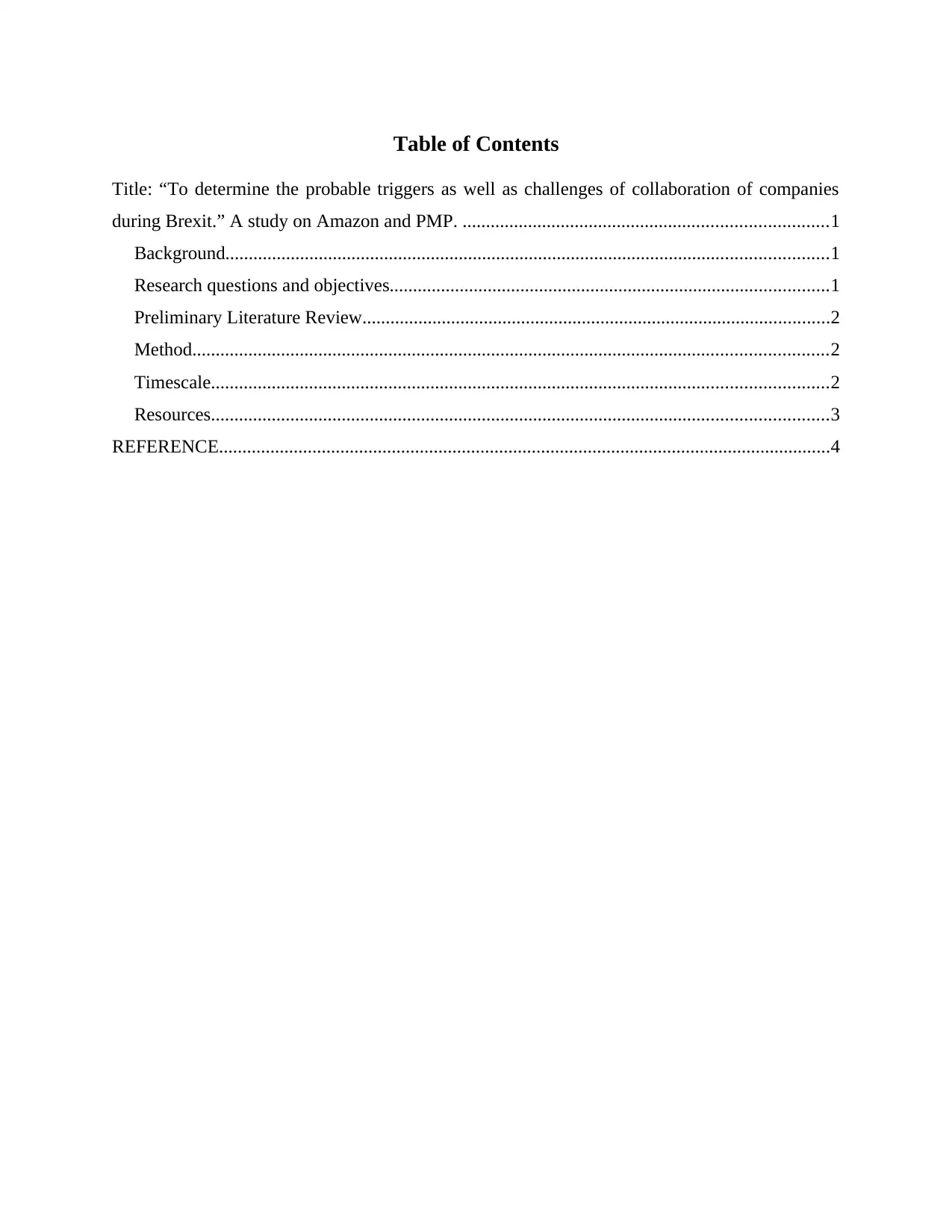
Table of Contents
Title: “To determine the probable triggers as well as challenges of collaboration of companies
during Brexit.” A study on Amazon and PMP. ..............................................................................1
Background.................................................................................................................................1
Research questions and objectives..............................................................................................1
Preliminary Literature Review....................................................................................................2
Method........................................................................................................................................2
Timescale....................................................................................................................................2
Resources....................................................................................................................................3
REFERENCE...................................................................................................................................4
Title: “To determine the probable triggers as well as challenges of collaboration of companies
during Brexit.” A study on Amazon and PMP. ..............................................................................1
Background.................................................................................................................................1
Research questions and objectives..............................................................................................1
Preliminary Literature Review....................................................................................................2
Method........................................................................................................................................2
Timescale....................................................................................................................................2
Resources....................................................................................................................................3
REFERENCE...................................................................................................................................4

⊘ This is a preview!⊘
Do you want full access?
Subscribe today to unlock all pages.

Trusted by 1+ million students worldwide
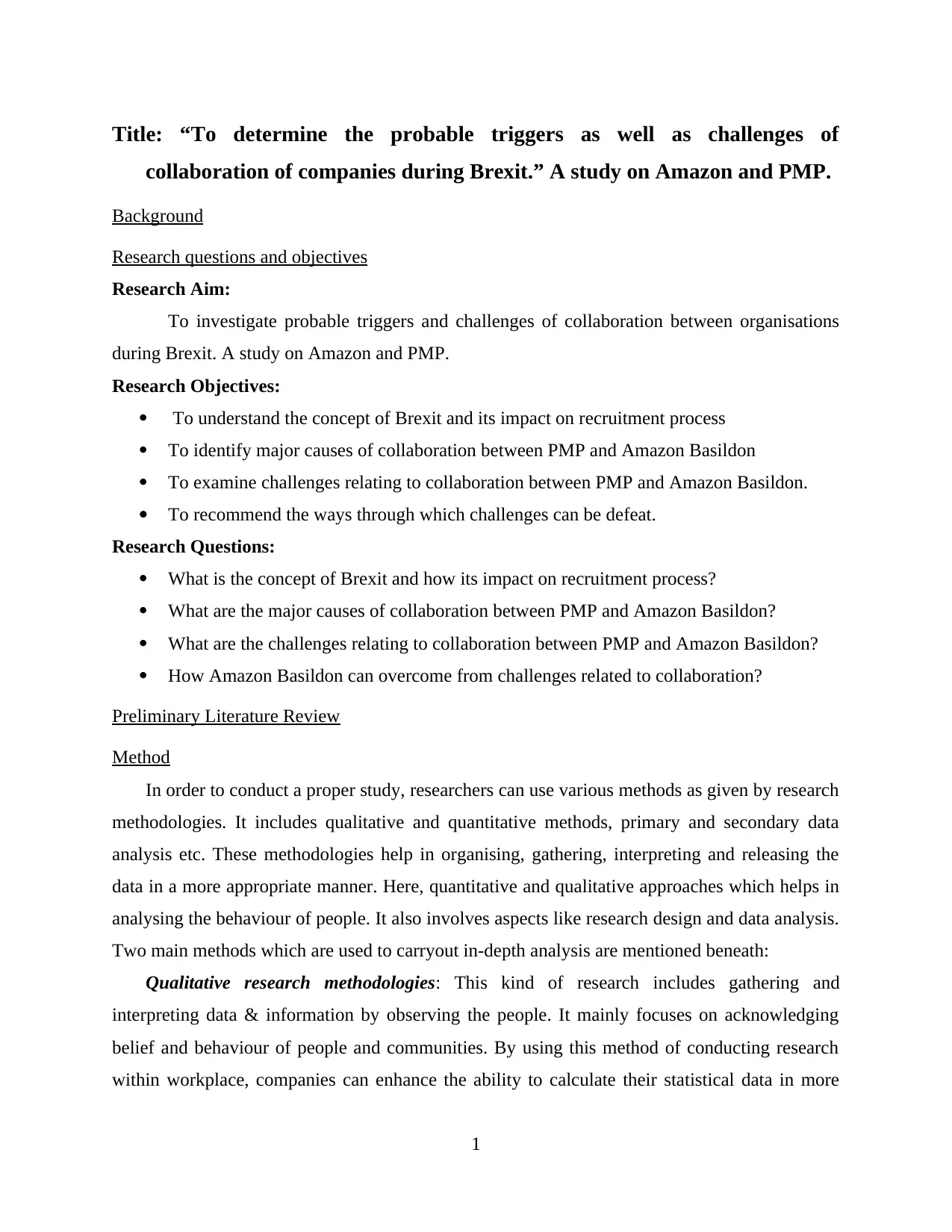
Title: “To determine the probable triggers as well as challenges of
collaboration of companies during Brexit.” A study on Amazon and PMP.
Background
Research questions and objectives
Research Aim:
To investigate probable triggers and challenges of collaboration between organisations
during Brexit. A study on Amazon and PMP.
Research Objectives:
To understand the concept of Brexit and its impact on recruitment process
To identify major causes of collaboration between PMP and Amazon Basildon
To examine challenges relating to collaboration between PMP and Amazon Basildon.
To recommend the ways through which challenges can be defeat.
Research Questions:
What is the concept of Brexit and how its impact on recruitment process?
What are the major causes of collaboration between PMP and Amazon Basildon?
What are the challenges relating to collaboration between PMP and Amazon Basildon?
How Amazon Basildon can overcome from challenges related to collaboration?
Preliminary Literature Review
Method
In order to conduct a proper study, researchers can use various methods as given by research
methodologies. It includes qualitative and quantitative methods, primary and secondary data
analysis etc. These methodologies help in organising, gathering, interpreting and releasing the
data in a more appropriate manner. Here, quantitative and qualitative approaches which helps in
analysing the behaviour of people. It also involves aspects like research design and data analysis.
Two main methods which are used to carryout in-depth analysis are mentioned beneath:
Qualitative research methodologies: This kind of research includes gathering and
interpreting data & information by observing the people. It mainly focuses on acknowledging
belief and behaviour of people and communities. By using this method of conducting research
within workplace, companies can enhance the ability to calculate their statistical data in more
1
collaboration of companies during Brexit.” A study on Amazon and PMP.
Background
Research questions and objectives
Research Aim:
To investigate probable triggers and challenges of collaboration between organisations
during Brexit. A study on Amazon and PMP.
Research Objectives:
To understand the concept of Brexit and its impact on recruitment process
To identify major causes of collaboration between PMP and Amazon Basildon
To examine challenges relating to collaboration between PMP and Amazon Basildon.
To recommend the ways through which challenges can be defeat.
Research Questions:
What is the concept of Brexit and how its impact on recruitment process?
What are the major causes of collaboration between PMP and Amazon Basildon?
What are the challenges relating to collaboration between PMP and Amazon Basildon?
How Amazon Basildon can overcome from challenges related to collaboration?
Preliminary Literature Review
Method
In order to conduct a proper study, researchers can use various methods as given by research
methodologies. It includes qualitative and quantitative methods, primary and secondary data
analysis etc. These methodologies help in organising, gathering, interpreting and releasing the
data in a more appropriate manner. Here, quantitative and qualitative approaches which helps in
analysing the behaviour of people. It also involves aspects like research design and data analysis.
Two main methods which are used to carryout in-depth analysis are mentioned beneath:
Qualitative research methodologies: This kind of research includes gathering and
interpreting data & information by observing the people. It mainly focuses on acknowledging
belief and behaviour of people and communities. By using this method of conducting research
within workplace, companies can enhance the ability to calculate their statistical data in more
1
Paraphrase This Document
Need a fresh take? Get an instant paraphrase of this document with our AI Paraphraser
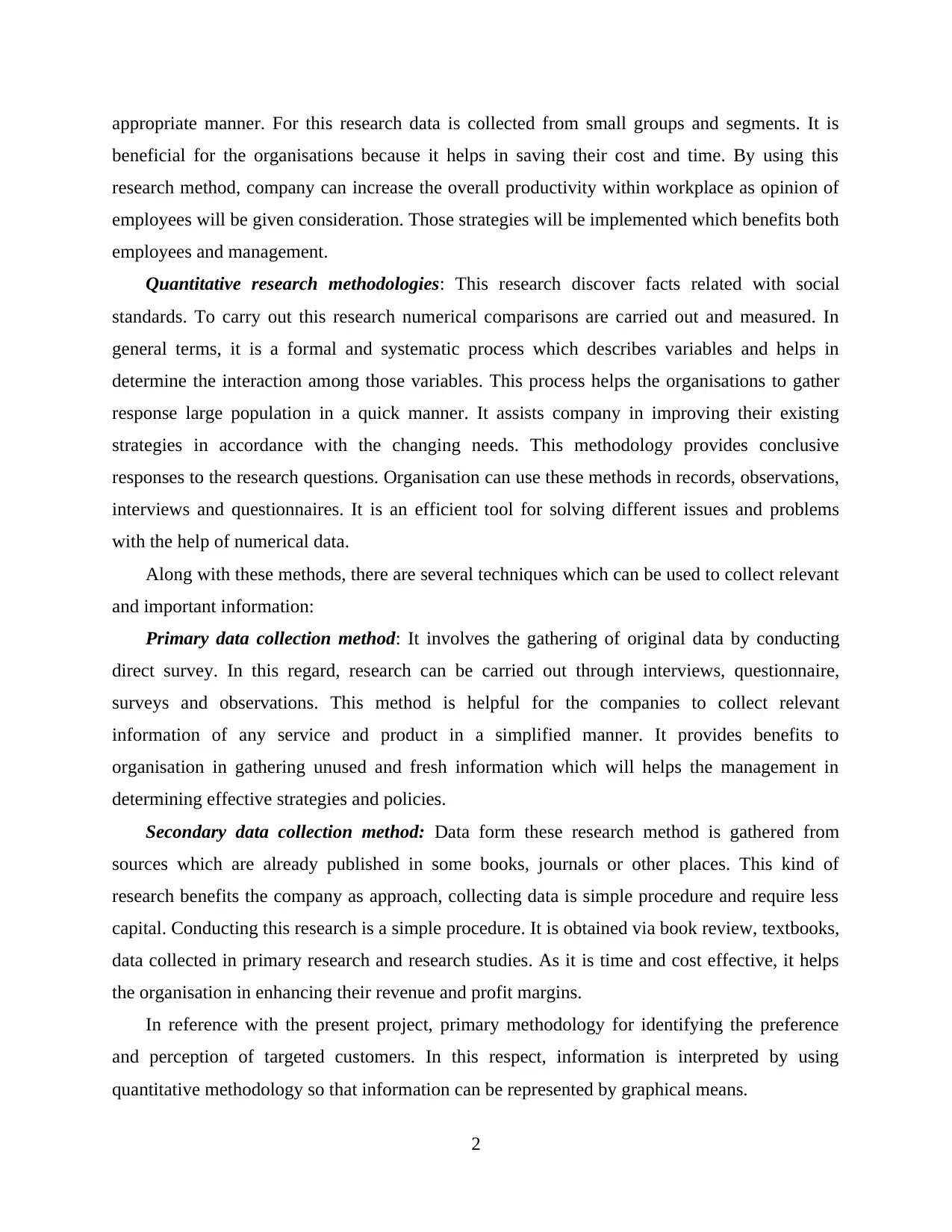
appropriate manner. For this research data is collected from small groups and segments. It is
beneficial for the organisations because it helps in saving their cost and time. By using this
research method, company can increase the overall productivity within workplace as opinion of
employees will be given consideration. Those strategies will be implemented which benefits both
employees and management.
Quantitative research methodologies: This research discover facts related with social
standards. To carry out this research numerical comparisons are carried out and measured. In
general terms, it is a formal and systematic process which describes variables and helps in
determine the interaction among those variables. This process helps the organisations to gather
response large population in a quick manner. It assists company in improving their existing
strategies in accordance with the changing needs. This methodology provides conclusive
responses to the research questions. Organisation can use these methods in records, observations,
interviews and questionnaires. It is an efficient tool for solving different issues and problems
with the help of numerical data.
Along with these methods, there are several techniques which can be used to collect relevant
and important information:
Primary data collection method: It involves the gathering of original data by conducting
direct survey. In this regard, research can be carried out through interviews, questionnaire,
surveys and observations. This method is helpful for the companies to collect relevant
information of any service and product in a simplified manner. It provides benefits to
organisation in gathering unused and fresh information which will helps the management in
determining effective strategies and policies.
Secondary data collection method: Data form these research method is gathered from
sources which are already published in some books, journals or other places. This kind of
research benefits the company as approach, collecting data is simple procedure and require less
capital. Conducting this research is a simple procedure. It is obtained via book review, textbooks,
data collected in primary research and research studies. As it is time and cost effective, it helps
the organisation in enhancing their revenue and profit margins.
In reference with the present project, primary methodology for identifying the preference
and perception of targeted customers. In this respect, information is interpreted by using
quantitative methodology so that information can be represented by graphical means.
2
beneficial for the organisations because it helps in saving their cost and time. By using this
research method, company can increase the overall productivity within workplace as opinion of
employees will be given consideration. Those strategies will be implemented which benefits both
employees and management.
Quantitative research methodologies: This research discover facts related with social
standards. To carry out this research numerical comparisons are carried out and measured. In
general terms, it is a formal and systematic process which describes variables and helps in
determine the interaction among those variables. This process helps the organisations to gather
response large population in a quick manner. It assists company in improving their existing
strategies in accordance with the changing needs. This methodology provides conclusive
responses to the research questions. Organisation can use these methods in records, observations,
interviews and questionnaires. It is an efficient tool for solving different issues and problems
with the help of numerical data.
Along with these methods, there are several techniques which can be used to collect relevant
and important information:
Primary data collection method: It involves the gathering of original data by conducting
direct survey. In this regard, research can be carried out through interviews, questionnaire,
surveys and observations. This method is helpful for the companies to collect relevant
information of any service and product in a simplified manner. It provides benefits to
organisation in gathering unused and fresh information which will helps the management in
determining effective strategies and policies.
Secondary data collection method: Data form these research method is gathered from
sources which are already published in some books, journals or other places. This kind of
research benefits the company as approach, collecting data is simple procedure and require less
capital. Conducting this research is a simple procedure. It is obtained via book review, textbooks,
data collected in primary research and research studies. As it is time and cost effective, it helps
the organisation in enhancing their revenue and profit margins.
In reference with the present project, primary methodology for identifying the preference
and perception of targeted customers. In this respect, information is interpreted by using
quantitative methodology so that information can be represented by graphical means.
2
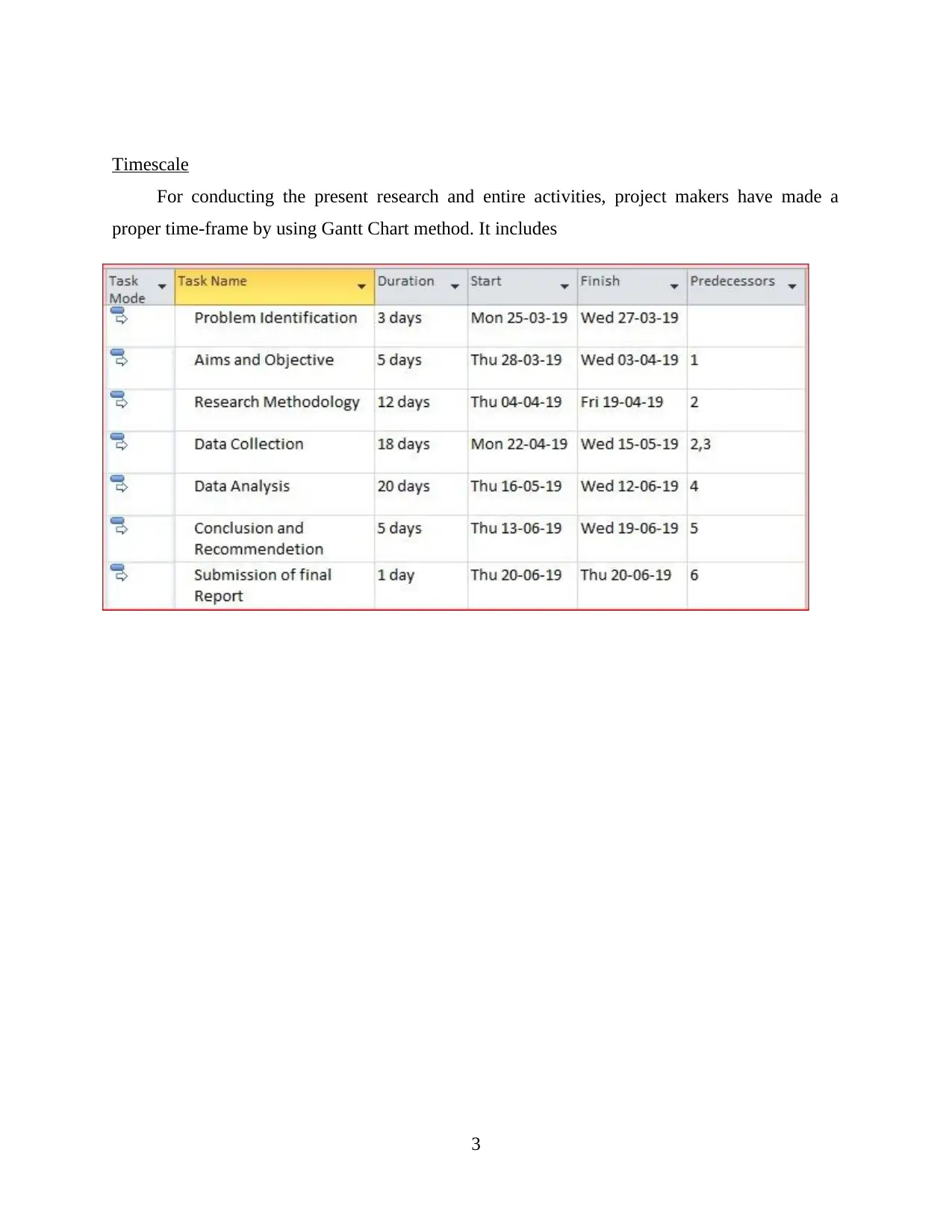
Timescale
For conducting the present research and entire activities, project makers have made a
proper time-frame by using Gantt Chart method. It includes
3
For conducting the present research and entire activities, project makers have made a
proper time-frame by using Gantt Chart method. It includes
3
⊘ This is a preview!⊘
Do you want full access?
Subscribe today to unlock all pages.

Trusted by 1+ million students worldwide
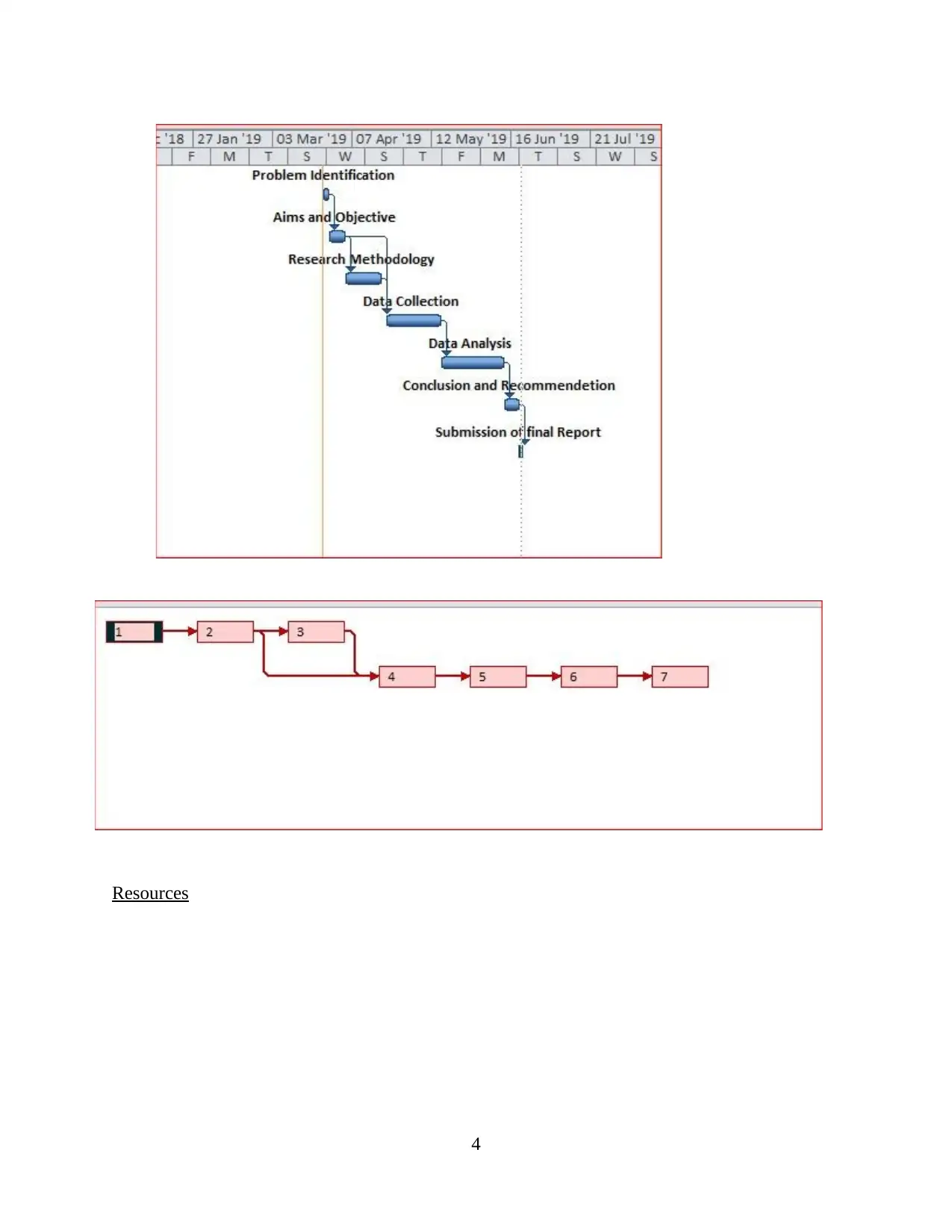
Resources
4
4
Paraphrase This Document
Need a fresh take? Get an instant paraphrase of this document with our AI Paraphraser
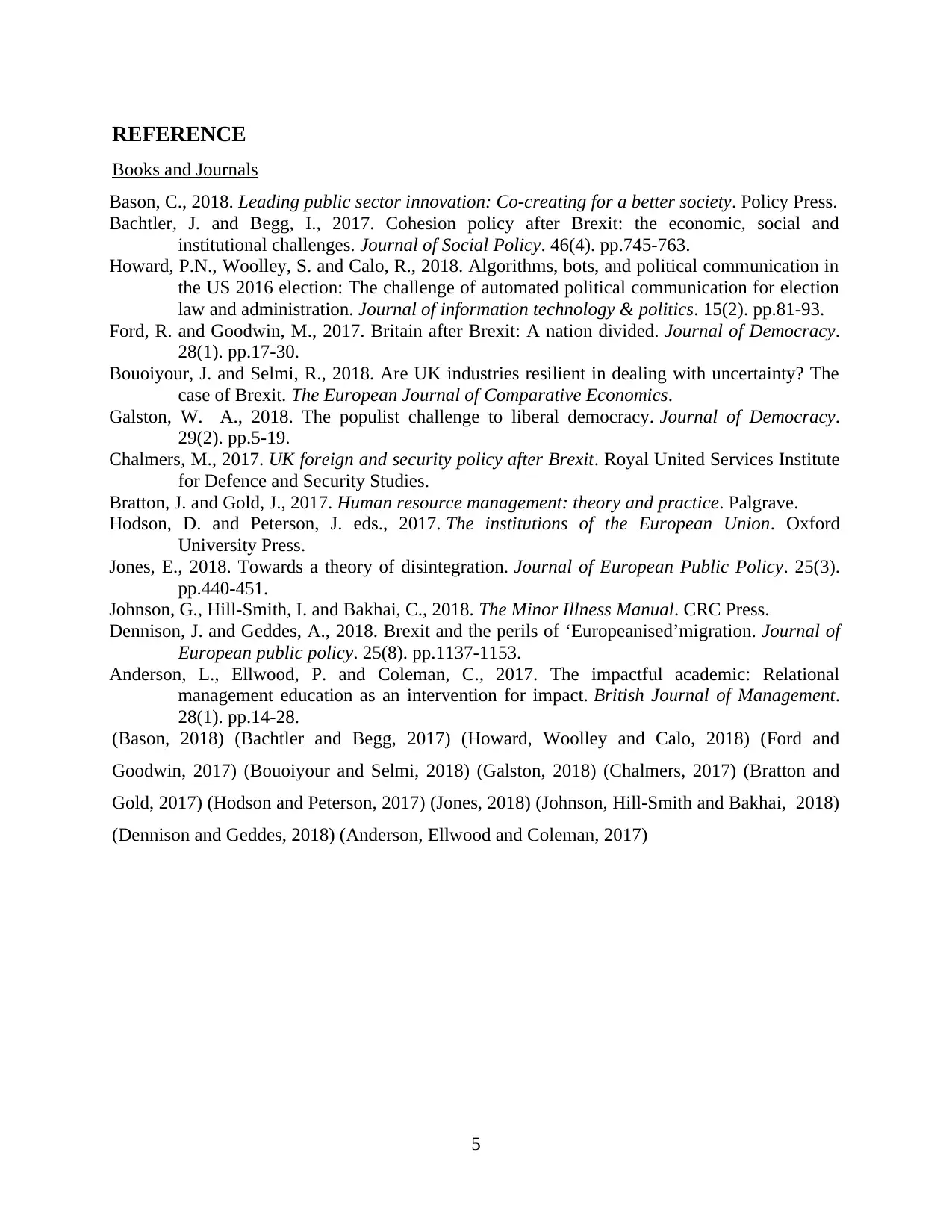
REFERENCE
Books and Journals
Bason, C., 2018. Leading public sector innovation: Co-creating for a better society. Policy Press.
Bachtler, J. and Begg, I., 2017. Cohesion policy after Brexit: the economic, social and
institutional challenges. Journal of Social Policy. 46(4). pp.745-763.
Howard, P.N., Woolley, S. and Calo, R., 2018. Algorithms, bots, and political communication in
the US 2016 election: The challenge of automated political communication for election
law and administration. Journal of information technology & politics. 15(2). pp.81-93.
Ford, R. and Goodwin, M., 2017. Britain after Brexit: A nation divided. Journal of Democracy.
28(1). pp.17-30.
Bouoiyour, J. and Selmi, R., 2018. Are UK industries resilient in dealing with uncertainty? The
case of Brexit. The European Journal of Comparative Economics.
Galston, W. A., 2018. The populist challenge to liberal democracy. Journal of Democracy.
29(2). pp.5-19.
Chalmers, M., 2017. UK foreign and security policy after Brexit. Royal United Services Institute
for Defence and Security Studies.
Bratton, J. and Gold, J., 2017. Human resource management: theory and practice. Palgrave.
Hodson, D. and Peterson, J. eds., 2017. The institutions of the European Union. Oxford
University Press.
Jones, E., 2018. Towards a theory of disintegration. Journal of European Public Policy. 25(3).
pp.440-451.
Johnson, G., Hill-Smith, I. and Bakhai, C., 2018. The Minor Illness Manual. CRC Press.
Dennison, J. and Geddes, A., 2018. Brexit and the perils of ‘Europeanised’migration. Journal of
European public policy. 25(8). pp.1137-1153.
Anderson, L., Ellwood, P. and Coleman, C., 2017. The impactful academic: Relational
management education as an intervention for impact. British Journal of Management.
28(1). pp.14-28.
(Bason, 2018) (Bachtler and Begg, 2017) (Howard, Woolley and Calo, 2018) (Ford and
Goodwin, 2017) (Bouoiyour and Selmi, 2018) (Galston, 2018) (Chalmers, 2017) (Bratton and
Gold, 2017) (Hodson and Peterson, 2017) (Jones, 2018) (Johnson, Hill-Smith and Bakhai, 2018)
(Dennison and Geddes, 2018) (Anderson, Ellwood and Coleman, 2017)
5
Books and Journals
Bason, C., 2018. Leading public sector innovation: Co-creating for a better society. Policy Press.
Bachtler, J. and Begg, I., 2017. Cohesion policy after Brexit: the economic, social and
institutional challenges. Journal of Social Policy. 46(4). pp.745-763.
Howard, P.N., Woolley, S. and Calo, R., 2018. Algorithms, bots, and political communication in
the US 2016 election: The challenge of automated political communication for election
law and administration. Journal of information technology & politics. 15(2). pp.81-93.
Ford, R. and Goodwin, M., 2017. Britain after Brexit: A nation divided. Journal of Democracy.
28(1). pp.17-30.
Bouoiyour, J. and Selmi, R., 2018. Are UK industries resilient in dealing with uncertainty? The
case of Brexit. The European Journal of Comparative Economics.
Galston, W. A., 2018. The populist challenge to liberal democracy. Journal of Democracy.
29(2). pp.5-19.
Chalmers, M., 2017. UK foreign and security policy after Brexit. Royal United Services Institute
for Defence and Security Studies.
Bratton, J. and Gold, J., 2017. Human resource management: theory and practice. Palgrave.
Hodson, D. and Peterson, J. eds., 2017. The institutions of the European Union. Oxford
University Press.
Jones, E., 2018. Towards a theory of disintegration. Journal of European Public Policy. 25(3).
pp.440-451.
Johnson, G., Hill-Smith, I. and Bakhai, C., 2018. The Minor Illness Manual. CRC Press.
Dennison, J. and Geddes, A., 2018. Brexit and the perils of ‘Europeanised’migration. Journal of
European public policy. 25(8). pp.1137-1153.
Anderson, L., Ellwood, P. and Coleman, C., 2017. The impactful academic: Relational
management education as an intervention for impact. British Journal of Management.
28(1). pp.14-28.
(Bason, 2018) (Bachtler and Begg, 2017) (Howard, Woolley and Calo, 2018) (Ford and
Goodwin, 2017) (Bouoiyour and Selmi, 2018) (Galston, 2018) (Chalmers, 2017) (Bratton and
Gold, 2017) (Hodson and Peterson, 2017) (Jones, 2018) (Johnson, Hill-Smith and Bakhai, 2018)
(Dennison and Geddes, 2018) (Anderson, Ellwood and Coleman, 2017)
5
1 out of 8
Related Documents
Your All-in-One AI-Powered Toolkit for Academic Success.
+13062052269
info@desklib.com
Available 24*7 on WhatsApp / Email
![[object Object]](/_next/static/media/star-bottom.7253800d.svg)
Unlock your academic potential
Copyright © 2020–2026 A2Z Services. All Rights Reserved. Developed and managed by ZUCOL.





